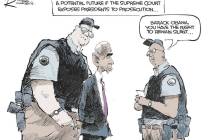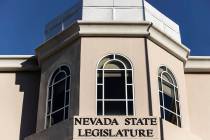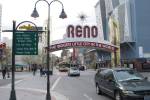Unsustainable, unfair
The state's political establishment should spend less time grumbling about the persistent rain soaking Nevada's economy and more time preparing for the Category 5 hurricane that could wipe it out altogether.
The Las Vegas Chamber of Commerce today released its third analysis on the lavish pay and benefits given to Nevada's government workers at the expense of the taxpaying masses. After previously finding that Nevada public employees are paid an average of 29 percent more than their private-sector counterparts, and that Nevada's local government workers have the eighth-highest public-sector salaries in the country, the chamber put its magnifying glass to the $6.3 billion hole in the state's public employee pension fund.
Well-documented but insufficiently addressed by the Nevada Legislature, the massive unfunded liability has left the Nevada Public Employees Retirement System among the least stable government pension plans in the country. The chamber analysis, completed by Applied Analysis and Hobbs, Ong & Associates, says the program is only 77 percent funded despite taxpayer contributions of more than $250 million this year solely for the unfunded accrued liability.
Nevada politicians have spent the better part of four decades transforming what was a reasonable and relatively sustainable system of compensation into a budget-busting monster with no relation to the private-sector industries that support it. In 1978, the system had seven active workers for every retiree collecting benefits. By fiscal year 2007, that ratio had fallen to 2.9 active workers for every pensioner. And with more early retirements and longer life expectancies, that ratio will shrink further in the years ahead, sending costs higher.
Not coincidentally, elected officials are noticing they have less and less to spend on the basic services their constituents expect. Think state lawmakers could have used the aforementioned $250 million to balance the general fund this summer? Instead, they socked it away so one day they can pay productive public employees to stop working. This budgetary strain will only get worse.
At some point in the foreseeable future -- perhaps 10 or 15 years from now -- the bill on the unfunded liability will come due, and PERS won't be able to pay all the benefits it has promised. Then cash-strapped governments will have to make a politically and financially devastating choice: raise taxes by record levels to fund retirements that common taxpayers can only dream of, or gut budgets to the point that public agencies close their doors.
"We're trying to pull the curtain on the problems," said Guy Hobbs, who helped compile the report for the Chamber of Commerce. "Does it have to implode before we address it? Is that being too idealistic?"
No. Although the report's authors said in a Monday meeting with the Review-Journal's editorial board that it's impossible to pinpoint the year of the system's collapse, PERS is clearly unsustainable and in need of reforms, lest "large underfunded long-term liabilities put future budgets at risk, potentially affecting state funding for education and health care," the analysis said.
But making PERS economically sustainable won't mean a thing if the system remains so fundamentally unfair to the taxpayers who fund it.
Consider that long ago, it was understood that government workers accepted slightly lower pay in return for job stability, a favorable work schedule, excellent benefits, extra time off and a guaranteed, dignified retirement. Nevada's public employees now have the best of all worlds, with the highest salaries of any sector of the work force, gold-plated benefits and a retirement plan that allows them to stop working 20 years before private-sector workers are eligible for full Social Security benefits.
And Nevada public employees don't even pay into Social Security. In fact, most state and local government workers don't even pay into PERS -- you cover the entire bill for them, even as you struggle to save for your own retirement.
Nevada's public employees have become a separate, elite class with a significantly higher standard of living than the peasants who pay them. The highest salaries and the country's most generous pensions?
No more. Tomorrow, we'll lay out how lawmakers should tame this beast before it swallows Nevada's economy whole.























